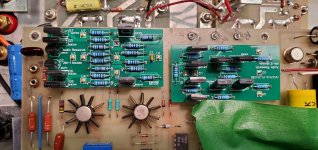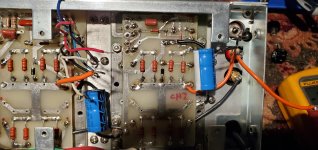I agree, it's hard to check the transistors on the module boards but what I could see appeared to be ok...Could you possibly provide a coupled of pics for the AM1/2 modules that show the transistor orientations better?
That pix is how I got the amp. All the top row of the 4 PNP in the middle been replaced with MJ1016, and the far right 2 NPN are now MJ15015.
Also I have replaced quite a few of the MJ15004 and MJ15003.The far right channel NPN are original and I got 2 extra that came with the amp.
I redid all the caps and resistors on the 4 circuit boards, soi not sure what is causing the dc to get into the output. I verified all the rest of the TO-3 that are not shorted.
Also I have replaced quite a few of the MJ15004 and MJ15003.The far right channel NPN are original and I got 2 extra that came with the amp.
I redid all the caps and resistors on the 4 circuit boards, soi not sure what is causing the dc to get into the output. I verified all the rest of the TO-3 that are not shorted.
The AM1 and AM2 new boards I built are not the issue and I think the originals are ok, the issue is leaking of the DC through the outputs to the output.
I tend to agree with you...I've experienced a dc offset on one channel, regardless of the AM module channel connections; I had the offset on the left channel, and I swapped both AM modules between channels and the offset did not track with the AM modules. I personally think that I have something shorting on the output side, which is why I've removed and checked every output transistor...I've found 7 bad (4 with shorts and 3 leaky) -- I have purchased replacements for ALL of the output transistors, which I will match to the best of my ability and reinstall...If this doesn't fix the offset issue, I'll give-up and save all of the new components and part it out on eBay.
I meant the ones on the AM module boardsThey all go in the same way. Here is a pix when I got the amp. I replaced the one diode which was ok and also one .1 cap which I just finished replacing it when I redid the boards, no change. I am stumped what else to check
Last edited:
The transistors are all ok on the AM boards. You can see the pix I posted. It's the TO-3 transistors that's is causing some dc to get into the output. Disconnecting that pre driver board with the AM-1, AM-2 new boards was not the cause of the dc offset. I believe my old AM-1 and AM-2 are fine, but I still went ahead and built the new ones and installed them. I went over every single TO-3 NPN and PNP and even changed a few to get the hfe closer. I had no shorts, so not sure what is causing the DC to flow from the collector to the emitter.
With a ~50V offset, I would suggest rechecking the diodes CR21-24. Are you totally sure that there are no collector to emitter shorts on any of the output transistors? You may also check the 0.47uf caps C31 and C32...There really aren't a lot of places that -50V can show up directly to the output. You may also check for any solder shorts or some wires touching.Well after spending hours installing some new transistors where are few were suspicious transistors, I have 6.01 volts on the left channel and -50.2 on the right. I have run out of ideas. There were no shorts indicated when I had the 4 boards off. Any ideas?
My amp's offset was 20ua on one channel and ~9v on the other, and I found issues with the output transistors, so I'm cautiously optimistic that replacing and matching the output transistors will resolve my complaint...fingers crossed.
Last edited:
Working on the right channel for now and have disconnected all the jumpers between the 2 right channel boards. With a fuse in the neg supply I am getting the full -53v on the neg board. I have replaced all components, so not sure what is going on. When I had the board off all TO-3 were fine, no shorts, I cannot see how that -53 is getting on to output. I can't see anything. I may have to unsolder the board again.Mine didn't come with .47 caps across the 300uf. I think I did try one and it didn't make a difference. I might have a leaky transistor that is not showing up with an ohmmeter or transistor checker.
Attachments
Oh, Ok...I just didn't see the second .1uf cap at the top of the first board on the right, must be hidden under the frame. Anyway, I'll be replacing and matching the output transistors this weekend, so we'll see if that fixes the offset voltage on the outputs...For such a high-end amp in it's day, ARC certainly made these things hard to service!
I just finished removing the far right hand board and no shorts on the 4 PNP. I am getting 0 ohms collector to emitter and leads flipped 1.1M.
The NPN at the top are original and they measure around 400k. Not sure if I should order 2 more to replace those, and one PNP , I replaced 2 PNP already and have 1 more I can put in, then all 6 devices in that bamk would be new.
The NPN at the top are original and they measure around 400k. Not sure if I should order 2 more to replace those, and one PNP , I replaced 2 PNP already and have 1 more I can put in, then all 6 devices in that bamk would be new.
Collector to emitter resistance of 0 ohms seems like a short to me...even 400k seems low (leaky?), in theory shouldn't the C-E resistance be in the Mohms at least (essentially infinite)?
Sorry not 0 ohms, infinity. Maybe the 2 NPN which have not been replaced and measure around the 400k, are leaky and test ok with a transistor tester but when -50 volts get applied they go short. I checked the circuit board and no issues, all caps are new, so it has to be one transistor letting the -50v onto the output. I still have +6v on the left to deal with but one thing at a time.
Well, I'm doing the shotgun approach and replacing all output transistors...I honestly don't know where else to look for my dc offset, like with you, everything else that could be a problem has been either replaced and/or tested out of circuit 100% good.
I decided to replace the rest of the original transistors not yet replaced, so coming Tuesday, hopefully that will fix everything!! No wonder I stick with tubes..these SS amps are terrible to work on and troubleshoot.
I just received all of the output transistors (yay!) so the rebuild can continue...These early ARC amps are particularly difficult to work on, because everything uses soldered connections, so disassembly and test is very annoying; this is the worst amp I've every worked on!
- Home
- Amplifiers
- Solid State
- How to fix the Audio Research D-110 modules



